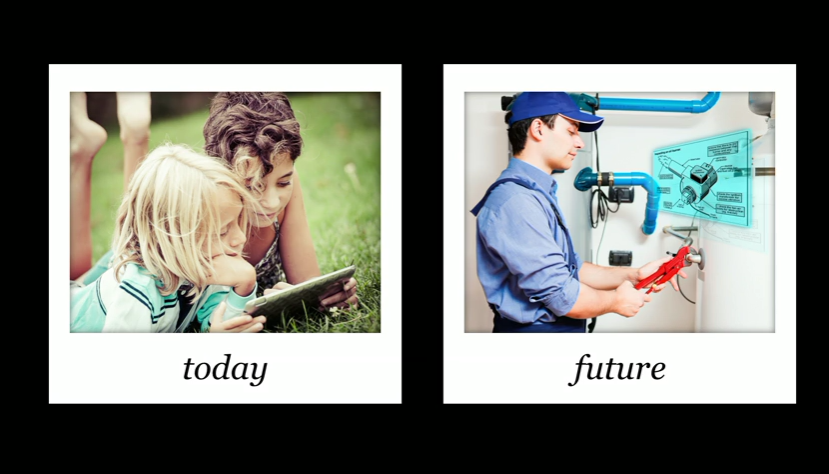I got the camera angle wrong.
我把相機角度弄錯了。
That one is just amateur stuff, but what she was saying, as you could make out, was about neurons, with her hands were like that,
那是張業余作品,但是她說話的內容,你們能聽得出來,是關于神經元的,她的手那樣比劃,
and she was saying neurons communicate. At 12.
她正在說神經元之間的信息傳遞。12歲。
So what are jobs going to be like?
那么工作將會變成怎樣呢?
Well, we know what they're like today. What's learning going to be like?
唔,我們知道他們現在的樣子。學習將會變成怎樣呢?
We know what it's like today, children pouring over with their mobile phones on the one hand
我們知道它現在的情形,孩子們蜂擁而來一手抓著手機
and then reluctantly going to school to pick up their books with their other hand.
然后不情愿地去學校用另一個手拿起課本。
What will it be tomorrow? Could it be that we don't need to go to school at all?
明天會是怎樣的情景?會變成我們完全不用去學校嗎?
Could it be that, at the point in time when you need to know something, you can find out in two minutes?
會變成,在某個時間你需要了解什么,你能在兩分鐘里查到嗎?
Could it be -- a devastating question, a question that was framed for me by Nicholas Negroponte -- could it be that we are heading towards or maybe in a future where knowing is obsolete?
會不會變成——尼葛洛龐帝提了一個非常棘手的問題,難住了我——會不會變成我們所向往的那樣又或者在將來連知識都會過時了?
But that's terrible. We are homo sapiens.
但那樣太糟糕了。我們是智人。
Knowing, that's what distinguishes us from the apes.
正是知識,把我們和猿猴區分出來。

But look at it this way. It took nature 100 million years to make the ape stand up and become Homo sapiens.
但不妨這樣想。大自然用了1億年讓猿站立起來變成智人。
It took us only 10,000 to make knowing obsolete. What an achievement that is. But we have to integrate that into our own future.
我們只花了1萬年讓知識成為過去時。這是多大的成就。但我們必須把這些成就納入我們的未來一起考慮。
Encouragement seems to be the key.
也許關鍵在于激勵機制。
If you look at Kuppam, if you look at all of the experiments that I did, it was simply saying, "Wow," saluting learning.
想想Kuppam,想想所有我做過的實驗,“哇!”那些都僅僅是在向學習致敬。
There is evidence from neuroscience, the reptilian part of our brain, which sits in the center of our brain,
神經系統科學表明,位于我們大腦中央位置的爬行動物腦,
when it's threatened, it shuts down everything else, it shuts down the prefrontal cortex, the parts which learn, it shuts all of that down.
當它受到威脅時會使其他部分停工,它會關閉負責學習的額葉皮質,把它完全關閉。
Punishment and examinations are seen as threats.
懲罰和考試都被看作是威脅。
We take our children, we make them shut their brains down, and then we say, "Perform."
我們讓孩子們過來,讓他們關閉自己的大腦,然后說:“做吧。”
Why did they create a system like that? Because it was needed.
為什么會有這樣一個系統?因為這是種需要。
There was an age in the Age of Empires when you needed those people who can survive under threat.
在帝國時代,你需要一些能夠受到威脅而能存活下來的人。
When you're standing in a trench all alone, if you could have survived, you're okay, you've passed.
當你獨自站在戰壕里,要是你活下來了,好吧,你過關了。
If you didn't, you failed. But the Age of Empires is gone.
如果沒有,你就輸了。但帝國時代已經遠去了。
What happens to creativity in our age? We need to shift that balance back from threat to pleasure.
在我們這個時代應該如何對待創造力?我們必須把它扭轉過來,從威脅變為樂趣。











